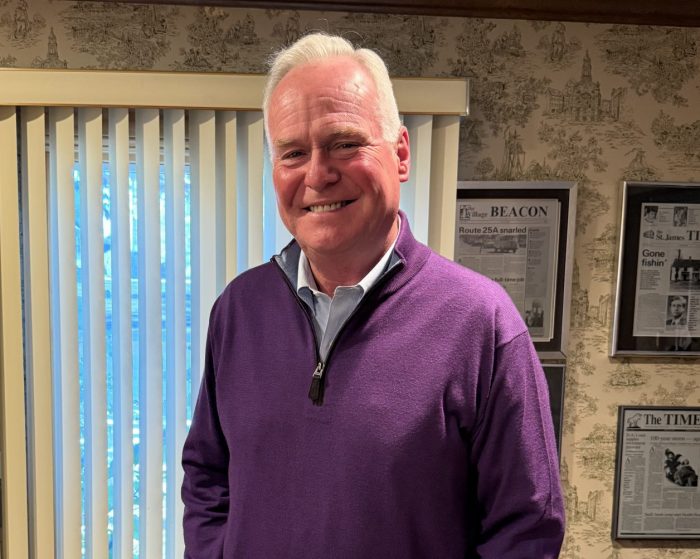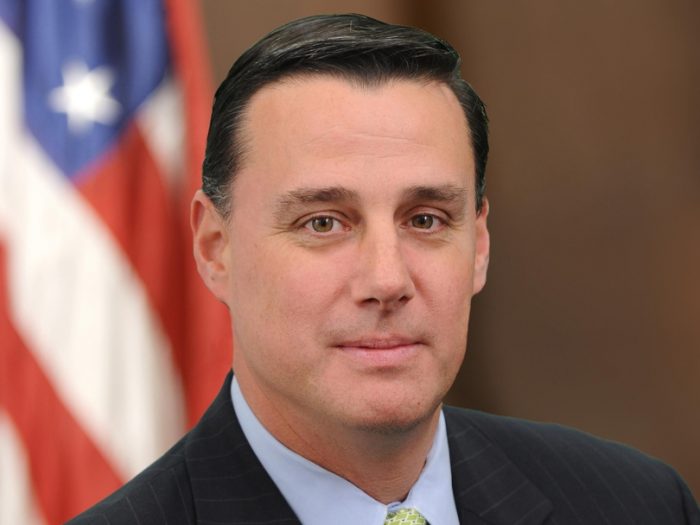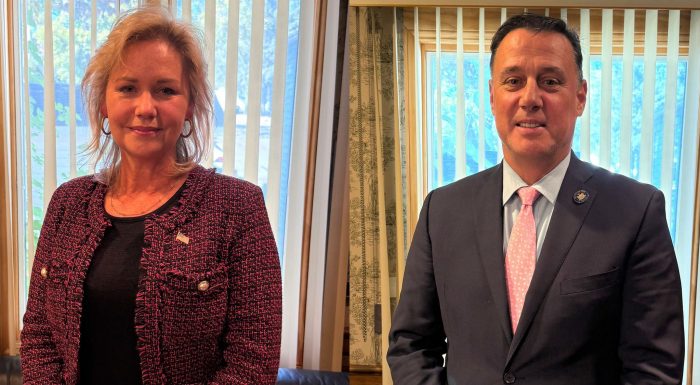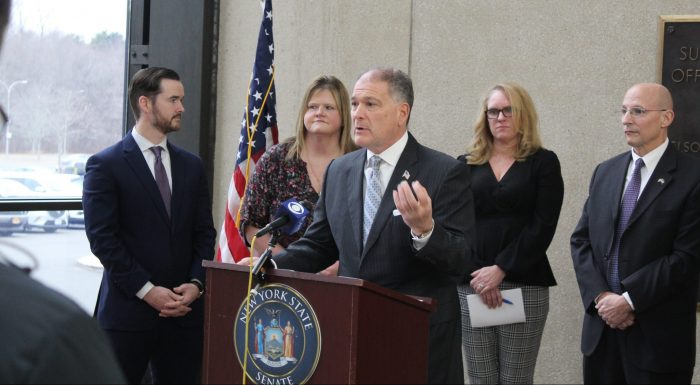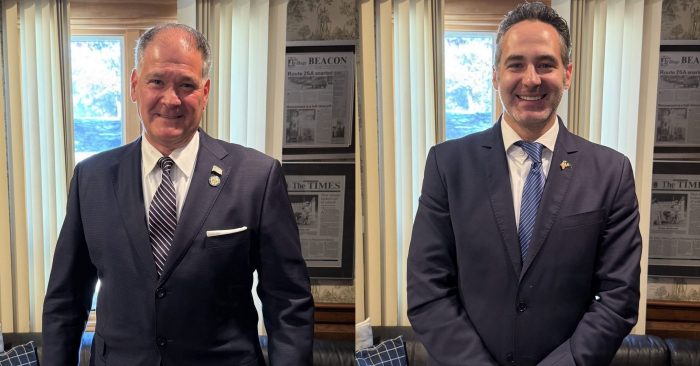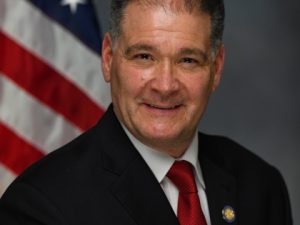By Toni-Elena Gallo
In a recent meeting at the TBR News Media office for the 8th Assembly District covering Smithtown and parts of Islip, candidate Steve Basileo (D-St. James) and incumbent Michael Fitzpatrick (R-Smithtown) outlined their platforms focusing on housing, taxes, health care, renewable energy, education and school funding. Each candidate presented distinct priorities and approaches, providing voters with insight into how they would address the district’s needs.
Backgrounds and opening statements

Basileo is a newcomer to the district’s political scene. With a master’s degree in public policy from Stony Brook University and experience as a labor organizer, he emphasized his desire to bring fresh ideas and increased visibility to the Assembly office. Basileo recounted that he has canvassed “thousands upon thousands of doors,” noting that many residents feel underrepresented in Albany. He expressed a commitment to social issues, especially reproductive rights and LGBTQ+ protections, stating that his campaign would “reflect the evolving values of this district.” Basileo, who also has experience in constituent services from an internship with Suffolk County Legislator Sam Gonzalez (D-Brentwood), said he aims to foster a more accessible and proactive Assembly presence.
Fitzpatrick has represented the district for over 22 years in the New York State Assembly and previously served for 15 years on the Smithtown Town Council. He highlighted his long tenure as evidence of his deep understanding of district issues, saying, “I believe I have reflected [the community’s] values, their aspirations, their concerns.” Fitzpatrick described himself as fiscally conservative, focused on reducing government costs and treating taxpayer dollars responsibly, likening his role to that of a fiduciary. A financial professional by background, Fitzpatrick has worked in the pension industry and emphasized his experience in managing budgets and understanding complex fiscal policies. He framed his campaign as defending “the core values” of the district, advocating for financial stability and limited government.
Cost of living, housing and taxes
Both candidates addressed the high cost of living, housing shortages and tax burdens but proposed different solutions.
• Basileo advocated for increasing housing supply, citing successful approaches in cities like Minneapolis and Austin, Texas, where additional housing has helped stabilize rents. He supported converting underused commercial spaces into mixed-use developments and expanding accessory dwelling units as long as they meet safety standards. “When you look at the numbers, build more,” he explained, adding that expanded infrastructure would support housing growth.
• Fitzpatrick agreed on the need for more housing options but stressed careful management of infrastructure, focusing on recent sewer investments and transit-focused growth in downtown areas. He expressed reservations about Gov. Kathy Hochul’s (D) proposal to override local zoning rules, saying, “The state wants to push the zoning code — that will not fly here on Long Island.” On taxes, Fitzpatrick emphasized reducing government spending through pension reform, proposing a shift from defined-benefit to defined-contribution plans for public employees to sustainably manage costs.
• Basileo discussed a different approach to government resources, focusing on local services and connecting residents to state resources. He highlighted that an active Assembly office could help secure state funding for essential projects like infrastructure upgrades.
Health care
Basileo shared a personal perspective on health care, explaining that his autism diagnosis has given him firsthand experience with the challenges of accessing reliable care. He proposed enshrining Affordable Care Act protections such as coverage for preexisting conditions into state law to protect New Yorkers from potential federal changes. Additionally, Basileo suggested introducing a public insurance option to offer a lower-cost alternative for residents, aiming to make healthcare more accessible. “It’s an affordable option for people who want it,” he said, positioning health care as a fundamental issue for district residents.
Renewable energy, environment and infrastructure
Both candidates recognized the importance of renewable energy but differed in emphasis.
• Basileo argued that renewable energy, especially wind power, is essential for Long Island. He cited the state’s planned wind training center in Suffolk County as a job creation opportunity and a way to support sustainable energy production. “There’s good job opportunities here,” he said, adding that investment in wind and solar energy would be beneficial economically and environmentally, given Long Island’s vulnerability to climate change.
• Fitzpatrick took a measured stance on renewable energy, acknowledging the promise of green initiatives while emphasizing the need for balanced infrastructure readiness. He cautioned that the environmental benefits should be weighed against costs and said heavy reliance on green energy alone may not fully address the district’s immediate needs.
Immigration and public safety
• Fitzpatrick raised concerns about immigration, focusing on its potential impact on local resources and public safety. He shared a personal story from his time in El Paso, Texas, where he witnessed crime associated with immigration issues, reinforcing his belief that current policies should consider economic and social impacts on communities. Fitzpatrick voiced opposition to public campaign financing and criticized state spending on migrant housing, contending that these funds could address local priorities instead.
• Basileo, though not directly addressing immigration, spoke broadly about his commitment to an inclusive community. He emphasized protections for marginalized groups, reflecting his campaign’s broader theme of social inclusivity and support for community programs.
Education and Foundation Aid formula
Both candidates highlighted education as an essential issue in their platforms, particularly addressing the state’s Foundation Aid formula, which determines funding allocations for school districts.
• Basileo expressed support for revisiting and revising the Foundation Aid formula to ensure that funding is equitably distributed, particularly in districts facing high costs and diverse student needs. He argued that an update to the formula would help alleviate disparities across districts and provide Long Island schools with a fair share of state funding. Drawing on his labor-organizing experience, Basileo emphasized the importance of adequately funding public education to ensure quality resources for teachers and students. “Our schools deserve more resources to meet the needs of today’s students,” he said, advocating for a more equitable funding model that considers the unique challenges of Long Island’s high-cost areas.
• Fitzpatrick acknowledged that the Foundation Aid formula impacts school funding but called for a balanced approach that includes cost control. He noted that high pension and benefit costs for educators strain school budgets and taxpayer resources. Fitzpatrick proposed measures to improve the efficiency of school spending, including pension reform, which he believes would “help school districts manage their budgets without increasing the burden on taxpayers.” He emphasized that education funding should be used effectively and advocated for vocational training programs that align with local job market needs, arguing that practical education can benefit students and strengthen the local economy.
Downtown revitalization
On redeveloping Smithtown’s Main Street, Basileo proposed using state funding to make the area more pedestrian-friendly and economically vibrant. He pointed to successful models in other Long Island towns such as Babylon and Patchogue and expressed a desire for Smithtown to benefit from similar investment. “We deserve that same kind of thing,” Basileo argued, saying that revitalizing Smithtown’s downtown could improve the quality of life for residents and attract more businesses to the area.
Fitzpatrick highlighted specific challenges in redeveloping Smithtown, citing infrastructure constraints as a significant obstacle. He explained that limited sewer capacity has historically delayed downtown growth, though recent grants have helped improve these systems. Fitzpatrick mentioned the town’s hiring of Tritech Real Estate for a redevelopment study as a step toward addressing these issues, explaining that thoughtful planning around sewers and zoning would allow Smithtown’s downtown to eventually “grow and thrive.”
Closing arguments
In his closing remarks, Basileo emphasized his commitment to accessible constituent services and modern social values. He positioned himself as a candidate aligned with the district’s younger, more socially-conscious residents, particularly on issues like health care, housing and renewable energy. He expressed a vision of a proactive, full-time Assembly office focused on inclusivity and advocacy, arguing that “the Assembly presence can be much more than it is now.”
Fitzpatrick concluded by highlighting his long tenure and dedication to fiscal responsibility, focusing on reducing taxes and preserving local autonomy. He argued that his policies align with the district’s core economic and social values, appealing to voters concerned with government spending, local governance and sustainable growth. Fitzpatrick underscored that “experience matters,” asserting that his approach offers stability and prudent stewardship of taxpayer resources.
Summary
The debate provided voters a clear contrast between Basileo’s forward-looking, service-oriented platform and Fitzpatrick’s experience-based, fiscally-conservative approach. Basileo focused on social inclusivity, renewable energy, health care access and housing solutions that would benefit from increased state investment. Fitzpatrick emphasized conservative fiscal policies, the importance of local governance and infrastructure improvements, particularly in managing costs and resources responsibly.
Each candidate offered a distinct vision for the district, with Basileo advocating for a more active role in social and environmental issues and Fitzpatrick supporting traditional economic policies and structured growth. Voters in Smithtown and parts of Islip will need to weigh these perspectives as they decide who best addresses the district’s priorities and future needs.
Summary written with assistance from ChatGPT’s services, with all information vetted by TBR’s proofreading team.

